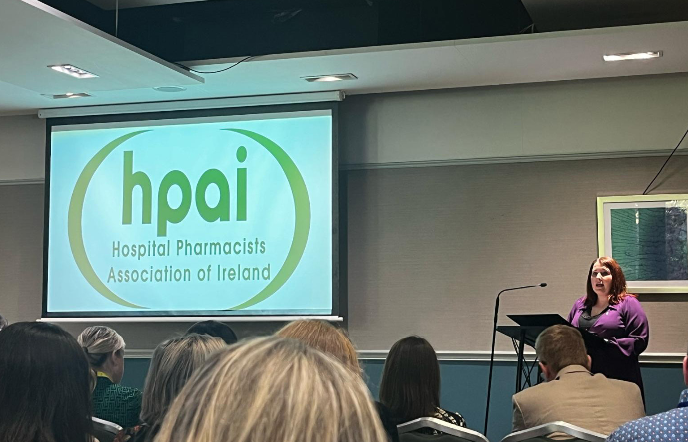Chair of Government pharmacy taskforce addresses Hospital Pharmacists Association of Ireland annual conference, writes Dawn O’Shea
Major changes are on the way for pharmacy in Ireland, the chair of the Government’s Expert Taskforce to Support the Expansion of the Role of Pharmacists in Ireland told the 2024 Annual Education Conference of the Hospital Pharmacists Association of Ireland (HPAI).
Prof Pat O’Mahony, Chair of the Board of the Health Information and Quality Authority (HIQA) and former Deputy Secretary General at the Department of Health, was appointed to chair the taskforce in July 2023.
He said the group expects to present its final recommendations to the Minister for Health by the end of May 2024. Included in these will be a recommendation to permit and support prescribing by pharmacists for a defined list of common conditions.
“It’s not a question of will there be an expansion in the role of the pharmacist. That decision has already been made and confirmed. This is something real. It is actually happening,” said Prof O’Mahony. “It’s a very exciting time to be involved in an initiative around pharmacy.”
On April 16, the Government approved the drafting of an amendment to the Health (Miscellaneous Provisions) Bill 2024 which will lay the groundwork for the introduction of pharmacist prescribing. The amendment will make provision in primary legislation for the further expansion of the role of pharmacists. The matter has now been referred to the Office of the Attorney General for drafting.
The taskforce is currently completing an initial list of common conditions for which pharmacist prescribing will be permitted.
He said the change will necessitate additional training and this will be provided at undergraduate and post-graduate level. However, he added, “there will be recognition of qualifications that people already have. Many have this already from postgraduate work or have a qualification from outside the Irish jurisdiction. And I am pushing for the recognition of prior experience if [the individual] is 25 years qualified”.
Prof O’Mahony expects the final set of recommendations to be completed within weeks. He gave assurances that the taskforce would consider issues specific to hospital pharmacists, including the prescribing of over-the-counter products.
“We now have an opportunity to move things on in a way that we have all looked for over an extended period of time. Let’s seize the moment,” he said.
Workload
With these additional duties on the horizon, the question is, can the current hospital pharmacy service bear this additional demand. A survey of heads of departments, conducted by the HPAI recently, found significant understaffing in hospital pharmacy departments across the country.
Of the 11 hospitals which participated in the survey, more than a third (36 per cent) had one to two pharmacy technician posts unfilled and another third (36 per cent) had three to four vacant technician posts.
In relation to staff grade hospital pharmacist positions, more than half of the hospitals had one to two vacant posts and nine per cent had three to four vacancies at this grade.
All of the hospitals who responded to the survey had at least one vacant senior pharmacist position. A third (36 per cent) had one to two posts unfilled, 27 per cent had three to four posts unfilled, and 18 per cent had five to seven unfilled posts. One hospital had between eight and 10 vacant senior pharmacist posts.
In five of the seven HSE hospitals surveyed, the recruitment freeze had severely impacted services.
Sustainable prescribing
A presentation by Dr Sharon Pfleger, a consultant in pharmaceutical public health with the NHS Highlands in Scotland, left jaws on the floor as she presented the evidence on levels of pharmaceutical pollution.

Dr Pfledger has qualifications in pharmacy and public health and is a visiting professor at the Robert Gordon University, School of Pharmacy and Life Sciences in Aberdeen. She has dedicated much of her career to tackling the issue of healthcare pollution. She is a founding member and NHS lead of the One Health Breakthrough Partnership, which is focused on the sustainable use of medicines and reducing antimicrobial resistance. She sits on various Scottish and UK government committees to tackle healthcare’s impact on the environment.
“The Hippocratic Oath – first do no harm – was developed with the patient in mind, but I would put it to you that that is now out of date. We are actually doing harm to our patients and our planet through the use of medicines,” she told the conference.
A study by Dublin City University (DCU) published in 2023 examined the levels of 16 specific pharmaceuticals in rivers across Ireland. A total of 53 high-risk and 64 moderate-risk concentrations were identified during the study period. Sulfamethoxazole and venlafaxine were most commonly detected. Diclofenac, metformin, trimethoprim, ciprofloxacin, and carbamazepine were also frequently identified. The study also found regional differences, with the River Suir having elevated levels of sulfamethoxazole, while the River Nore showing the lowest concentrations of venlafaxine.
Paracetamol is acutely toxic to nearly all species in aquatic environments
Research has already shown that this contamination is having an effect on the ecosystem. Fluoxetine contamination has been linked to delayed tadpole development and 17-alpha-Ethinylestradiol has resulted in the collapse of the fathead minnow population due to the feminisation of male fish. Paracetamol is acutely toxic to nearly all species in aquatic environments, resulting in neural, behavioural, and physiological adverse effects.
The scale of pharmaceutical pollution is significant and this has the potential to dramatically increase antimicrobial resistance. In the Indian city of Hyderabad, which plays host to 90 pharmaceutical factories, exceptionally high levels of ciprofloxacin were found in local lakes. Enough ciprofloxacin entered the waterflow every day to treat 90,000 people at therapeutic doses.
Seven years ago, Dr Pfleger co-founded the One Health Breakthrough Partnership – a collaboration between researchers, academics, water providers and regulators, environment agency representatives, and public health specialists from across Scotland which is working to reduce pharmaceutical pollution in the environment. The group has been impactful in driving the message of sustainable prescribing. In response to a dearth of information on the environmental impacts of different medications, the partnership is calling for this information to be included in prescribing formularies.
“It essentially means bringing environmental data alongside clinical and cost-effectiveness data. I might have two drugs in my formulary, drug A and drug B, and they are both clinically effective and both cost the same, but one of them is really eco-toxic. The prescriber doesn’t know which one is eco-toxic because we don’t have that information. What I’m trying to do is to put that into formularies,” she explained.
The move has been supported by a range of professional organisations including the Royal Pharmaceutical Society Scotland, the Academy of Medical Royal Colleges and Faculties in Scotland, and the Royal College of Physicians of Edinburgh.
“Eventually I see this work informing formulary development across the world. I want to help every prescriber, every pharmacist, to understand the impact of a drug on the environment and on their patient, and help them to pick the best one for both,” she said.
Further information on eco-friendly prescribing and pharmaceutical waste is available on the One Health Breakthrough Partnership website www.ohbp.org/.







